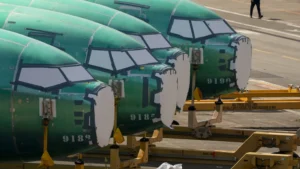Boeing’s Strategic Flight Path Through the U.S.-China Trade War
The Boeing China tariffs story continues to evolve as geopolitical tensions intensify. With new U.S. tariffs targeting Chinese imports and China’s retaliatory trade measures, Boeing is adjusting its global playbook to protect its delivery pipeline and revenue outlook.
Trade War Turbulence Hits Boeing’s China Business
A core challenge facing Boeing is the 145% U.S. tariff on Chinese goods, which was quickly met by a 125% countermeasure from China. These developments have effectively frozen Boeing’s ability to deliver planes to China—once a critical buyer of its aircraft.
According to CNBC, Boeing is now seeking new buyers for approximately 50 aircraft originally bound for Chinese airlines. This sudden shift underscores how deeply the Boeing China tariffs have disrupted operations.
Redirecting Deliveries and Diversifying Demand
Boeing is leveraging its global network to reallocate planes from the Chinese pipeline to other international customers. So far, this move has enabled the manufacturer to prevent excess inventory buildup while keeping production lines moving.
By diversifying away from China, Boeing aims to reduce long-term dependency on any single region—a risk-mitigation strategy that could prove critical if the trade dispute drags on.
“We’re not waiting for the policy environment to clear up. We’re building resilience now,” a Boeing spokesperson commented during their Q1 earnings call.
Boeing Delivers Financial Resilience Amid Headwinds
Despite the tariff fallout, Boeing reported a narrowed Q1 loss of $31 million, a significant improvement from the $355 million deficit in the same quarter last year. Revenues climbed 18% to $19.5 billion, fueled in part by deliveries of 104 737 Max jets.
This marks a turning point for the aerospace giant as it continues recovering from both pandemic-induced setbacks and previous production slowdowns.
The Boeing China tariffs situation may complicate future growth in Asia, but early signs suggest the company is regaining altitude—thanks to adaptive supply chain moves and global deal-making.
A Voice for Free Trade in a Shifting Global Market
Boeing CEO Dave Calhoun has been vocal about the need for stable, open trade routes, especially in sectors as globally integrated as aerospace. He cautioned that prolonged disruptions like the Boeing China tariffs not only affect supply chains but also risk long-term diplomatic fallout.
To that end, Boeing is reinforcing relationships in Europe, the Middle East, and Latin America—regions that could become crucial markets in a multipolar trading environment.
Conclusion: Charting a Course Through Crosswinds
While the Boeing China tariffs present short-term obstacles, Boeing’s quick pivot to global buyers and strategic diversification may help it maintain momentum. Traders and investors should monitor how geopolitical shifts and supply chain dynamics affect aerospace plays like Boeing, especially as policy headlines continue to drive volatility.
Related Reading from TraderInsight:

